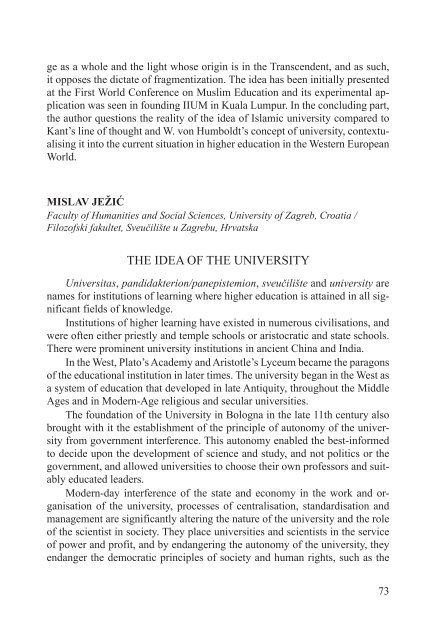Programska knjižica - Hrvatsko filozofsko društvo
Programska knjižica - Hrvatsko filozofsko društvo
Programska knjižica - Hrvatsko filozofsko društvo
Create successful ePaper yourself
Turn your PDF publications into a flip-book with our unique Google optimized e-Paper software.
ge as a whole and the light whose origin is in the Transcendent, and as such,<br />
it opposes the dictate of fragmentization. The idea has been initially presented<br />
at the First World Conference on Muslim Education and its experimental application<br />
was seen in founding IIUM in Kuala Lumpur. In the concluding part,<br />
the author questions the reality of the idea of Islamic university compared to<br />
Kant’s line of thought and W. von Humboldt’s concept of university, contextualising<br />
it into the current situation in higher education in the Western European<br />
World.<br />
MISLAV JEŽIĆ<br />
Faculty of Humanities and Social Sciences, University of Zagreb, Croatia /<br />
Filozofski fakultet, Sveučilište u Zagrebu, Hrvatska<br />
THE IDEA OF THE UNIVERSITY<br />
Universitas, pandidakterion/panepistemion, sveučilište and university are<br />
names for institutions of learning where higher education is attained in all significant<br />
fields of knowledge.<br />
Institutions of higher learning have existed in numerous civilisations, and<br />
were often either priestly and temple schools or aristocratic and state schools.<br />
There were prominent university institutions in ancient China and India.<br />
In the West, Plato’s Academy and Aristotle’s Lyceum became the paragons<br />
of the educational institution in later times. The university began in the West as<br />
a system of education that developed in late Antiquity, throughout the Middle<br />
Ages and in Modern-Age religious and secular universities.<br />
The foundation of the University in Bologna in the late 11th century also<br />
brought with it the establishment of the principle of autonomy of the university<br />
from government interference. This autonomy enabled the best-informed<br />
to decide upon the development of science and study, and not politics or the<br />
government, and allowed universities to choose their own professors and suitably<br />
educated leaders.<br />
Modern-day interference of the state and economy in the work and organisation<br />
of the university, processes of centralisation, standardisation and<br />
management are significantly altering the nature of the university and the role<br />
of the scientist in society. They place universities and scientists in the service<br />
of power and profit, and by endangering the autonomy of the university, they<br />
endanger the democratic principles of society and human rights, such as the<br />
73

















